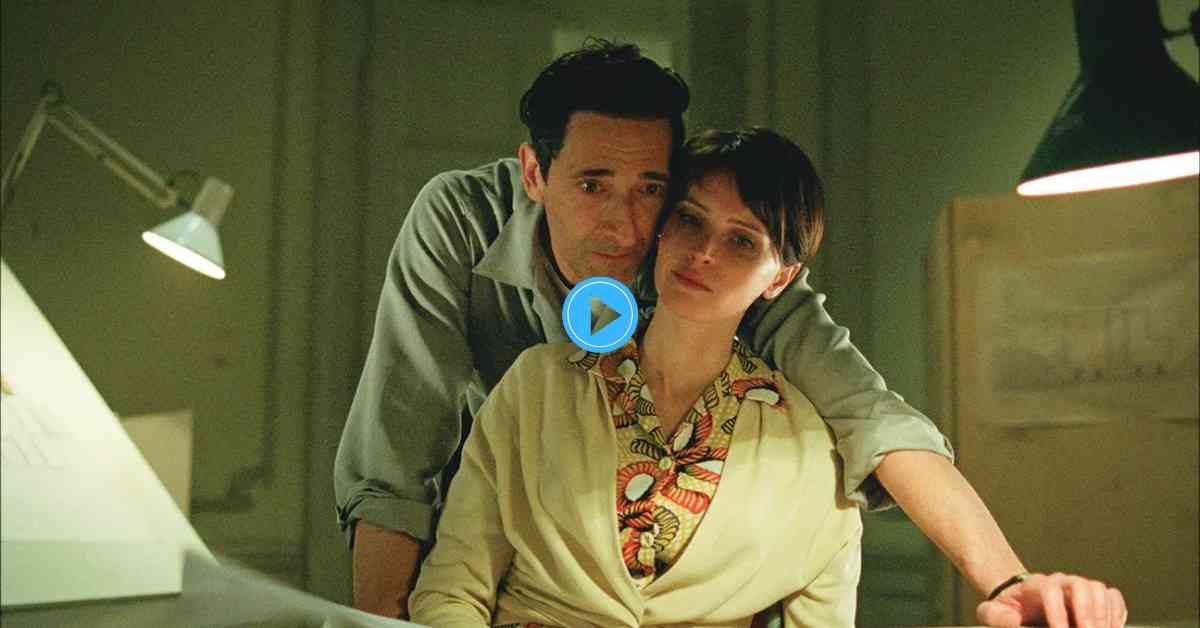The Brutalist Movie Review delves into Brady Corbet’s sweeping 2024 period drama, co-written with Mona Fastvold, which charts the life of László Tóth, a Hungarian-Jewish architect who survives the Holocaust and seeks to build greatness in America. Starring Adrien Brody as Tóth, alongside Felicity Jones, Guy Pearce, Joe Alwyn, Raffey Cassidy, Stacy Martin, Isaach de Bankolé, and Alessandro Nivola, the film spans decades of dreams, artistic ambition, personal loss, and the cost of pursuing the “American Dream.” Running about 215 minutes, The Brutalist is ambitious in scope, tone, and emotion. This review explores its strengths, weaknesses, performances, visuals, and whether its epic length pays off.
The Brutalist Movie Review – Plot Overview
After narrowly surviving the Holocaust, architect László Tóth (Adrien Brody) emigrates to America with his wife Erzsébet (Felicity Jones) and orphaned niece Zsófia (Raffey Cassidy). He arrives impoverished and haunted, but with ambition and skill. He secures commissions, including a defining project with industrialist Harrison Lee Van Buren (Guy Pearce), which promises financial success and prestige. But every milestone comes with sacrifice: personal relationships strained, creative compromises made, and cultural dislocation weighed heavily. Over three parts — arrival, maturation, and epilogue — the narrative tracks Tóth’s relentless drive, moments of beauty, bouts of destruction, and his struggle between artistic vision and survival.
Cast & Crew – Who Shapes This Creation
- Director & Writer: Brady Corbet (also co-writer with Mona Fastvold), whose stylistic and thematic choices deeply shape the film’s melancholic tone and beauty.
- Cinematography: Lol Crawley, delivering sweeping visuals, period detail, and scale that magnify both ambition and isolation.
- Main Cast:
• Adrien Brody as László Tóth — undead with trauma, yet relentlessly visionary.
• Felicity Jones as Erzsébet Tóth — emotional anchor, wife, partner in loss.
• Guy Pearce as Harrison Lee Van Buren — powerful patron, represents success and moral compromise.
• Joe Alwyn, Raffey Cassidy, Stacy Martin, Alessandro Nivola, Isaach de Bankolé — all contribute to a network of relationships that frame Tóth’s personal and creative world.
Style & Themes – Ambition, Exile & the Art of Building
The Brutalist is not just large in runtime — it is large in emotion, in artistic ambition, and in its questions. Some of its central themes:
- Art versus compromise: Tóth’s architectural vision frequently conflicts with practical realities — money, clients, political pressure.
- Exile and identity: Surviving trauma, displaced by war, the immigrant condition underpins every choice, relationship, and building.
- Love and loss: Personal relationships (with family, with supporters) are scarred by history, distance, and ambition.
- The cost of ambition: Great architecture, symbolic structures, public fame — at what personal cost do they come?
Visually, Corbet uses VistaVision format to evoke a mid-century cinematic grandness. Long takes, detailed period sets and costumes, muted color tones, intimate close-ups contrasted with vast architectural forms — all serve both story and mood.
Strengths & Weaknesses
Pros
- Powerful central performance by Adrien Brody, fully invested in Tóth’s pain and beauty.
- Lavish production design and cinematography that richly evoke post-war industrial America and the immigrant experience.
- Themes that resonate deeply: identity, exile, artistic integrity, and moral compromise.
- Ambitious storytelling structure — three parts that show growth, decline, and reflection.
- Critical acclaim and awards recognition — direction, acting, and technical merits widely praised.
Cons
- Extreme length (215 minutes) with intermission; endurance required by audience — pacing suffers in middle portions.
- Emotional weight can feel overwhelming; character arcs beyond Tóth sometimes underexplored.
- Tonal heaviness — not much levity or relief; some viewers may find it too slow or austere.
- Spectacle sometimes overshadows intimacy — large scale sacrifices some personal detail.
Reception & Box Office
The Brutalist premiered at the Venice International Film Festival on September 1, 2024, where Corbet won the Silver Lion for Best Direction. Its U.S. release (A24) came December 20, 2024; UK release followed in January 2025.
Budget was about US$9.6 million; worldwide gross stands around US$50.4 million, a strong return for such a long, serious film.
Critics largely praised the film’s ambition, Brody’s performance, and technical craftsmanship. Points of criticism focused on pacing, emotional access, and whether some narrative strands deserved more development.
Final Verdict – Is It Worth the Build?
This The Brutalist Movie Review concludes that The Brutalist is an audacious, deeply felt film. It demands patience, but in return offers emotional depth, luminous visuals, and major performances. If you appreciate art-films, period drama, or stories about exile, architecture, and moral complexity, this is a film to see. It mightn’t be perfect, and its pacing will divide audiences, but its artistic heights are real.
Rating: ★★★★☆ (4/5)
For more in-depth film reviews, thoughtful analyses, and cinematic breakdowns, check out GoMovies — where stories meet meaning on screen.
FAQs – The Brutalist Movie Review
What is The Brutalist about?
It follows László Tóth, a Hungarian-Jewish architect and Holocaust survivor, as he builds a life and career in post-war America, wrestling with art, loss, and the immigrant condition.
Who directed The Brutalist and who stars in it?
Directed by Brady Corbet (co-written with Mona Fastvold), starring Adrien Brody, Felicity Jones, Guy Pearce, Joe Alwyn, Raffey Cassidy, and others.
How long is the film and where was it filmed/released?
Runtime is approximately 215 minutes. It premiered at Venice (Sept 1, 2024) and released in the U.S. on December 20, 2024; UK in January 2025.
What are the biggest criticisms of The Brutalist?
Many viewers and critics point to its slow pacing, emotional heaviness, and under-development of some supporting characters, especially given its epic scale.
Does The Brutalist succeed in its artistic ambitions?
Yes — for many, its visual style, performance, thematic weight and scope elevate it above many contemporary period dramas. That said, its length and intensity make it less accessible for some audiences.


Leave a Reply